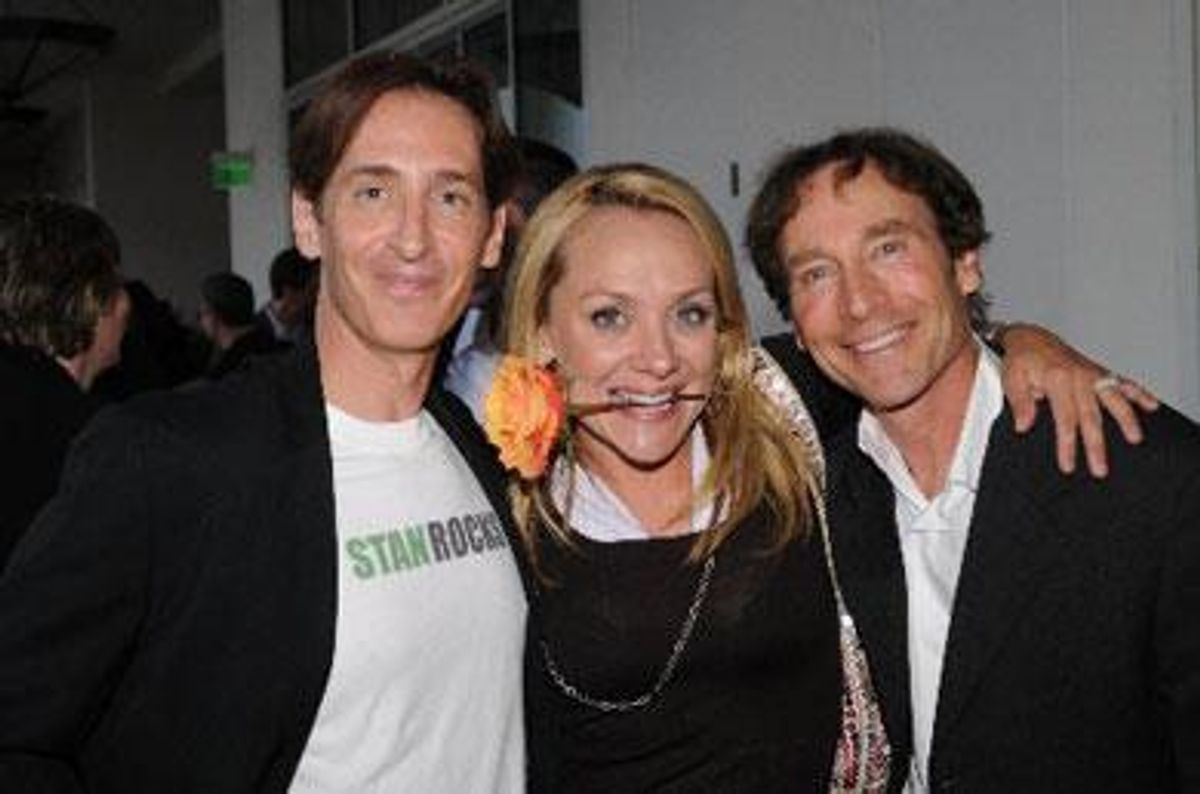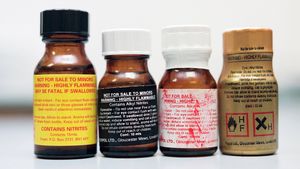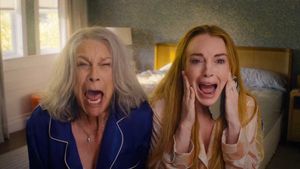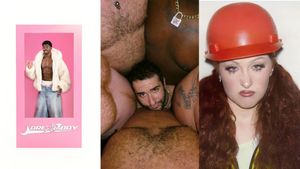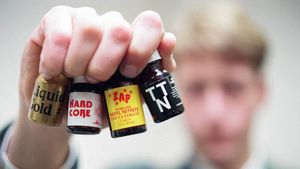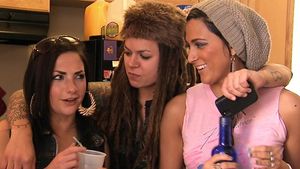The dream of
creating a sitcom from the ground up has always been the
drive behind Stan Zimmerman and Jim Berg's lifelong
writing partnership. Between classes and college jobs,
they'd spend all their time together, writing
scripts, and thinking up farfetched schemes for Hollywood
success. It didn't take long for the inseparable duo
to fall into the enviable position of writing for
The Golden Girls, crafting sassy quips for
everyone's favorite retiree divas.
After garnering a
Writers Guild nomination for the groundbreaking
"lesbian kiss" episode of Roseanne, writing for
Gilmore Girls, and working on film projects
including the upcoming Sarah Jessica Parker-attached The
Ivy Chronicles, Zimmerman and Berg are finally
living their dream. Their original comedy series Rita
Rocks, which they describe as Roseanne meets
Welcome to the Dollhouse, premiered on
Lifetime this month, starring Nicole Sullivan of
Mad TV as a frustrated working mom who gets
in touch with her creative side when she starts a rock band
in her garage.
Bolstered by
All Over the Guy's Richard Ruccolo
as Rita's devoted husband and Tisha Campbell-Martin
as their meddlesome mailwoman (who ends up playing
keyboard in Rita's band), Rita Rocks is a
back-to-basics multicamera sitcom that uses the sharp
comedic talents of its stars and writers to stay
competitive in a TV market saturated with reality shows,
single-camera sitcoms, and an avalanche of nearly identical
talent competitions.
Ironically,
it's those same talent competitions that made the
script for Rita Rocks a viable product after
floating between networks for 10 years, posits Berg:
"It took the zeitgeist of American Idol for
the industry to realize that people were interested in
music and seeing everyday people sing."
In this
Advocate.com exclusive, Zimmerman and Berg shed some light
on the surprisingly closeted atmosphere backstage on
The Golden Girls, the unique position of
queer voices in Hollywood, and the epic civil
rights-themed Broadway musical they're writing with
Cyndi Lauper.
Advocate.com:How did Rita Rocks end up on Lifetime? Did
you have any trepidation about marketing a
lighthearted sitcom on a network that's widely
known for its melodramatic TV movies?
Jim Berg: They said they wanted to try
something new, and we were willing to be their guinea pig.
Also, being a writer in this economy, where
they're making less and less TV
shows...you're not that choosy. If Lifetime wants to
make your script, you say, "Have at it!
Let's do it. Let's partner up and see what we
can do here." There's the joke about
Lifetime just being the melodramatic movies of the
week, but they were looking to branch out, and we believed
in them.
Stan Zimmerman: It was really smart of them to
cater to an audience that hasn't had a spotlight on
it recently. You know, working moms are just not
associated with sitcoms. Since Roseanne
there's only been one other show focused on a
working mom, and that's Life With
Bonnie.
It's
always about the dad and his pretty wife that steps in the
frame every now and then. It made sense that Lifetime
would want to explore comedy from the mom's
point of view.
You've worked on a number of female-focused
shows: Roseanne, TheGolden Girls, Gilmore Girls, and now
Rita Rocks. It brings to mind something
Lauren Hutton said when the Sex and the
City movie came out: that the portrayal of
femininity on that series couldn't be
authentic because it's written by gay men.
Zimmerman: Jim, you've always loved Lauren
Hutton--
Berg: I don't love her anymore!
Zimmerman: Let's call her now and get to the
bottom of this.
Berg: Maybe she was misquoted or taken out of
context--
Zimmerman: Bitch.
Well, to be fair, she did admit that she'd never
seen Sex and the City --right after
she said that.
Zimmerman: OK, she's drunk.
Berg: Oh, Lauren.
Lauren Hutton aside, it's hard to deny that some
of the most riveting and entertaining portrayals of
women on television have come from gay male
writers. Do you find it more comfortable to write
for female voices? Do you ever run into problems trying
to portray women's issues on TV?
Berg: We never run into problems. We think
it's a natural fit because, in some ways, both of us
have been oppressed, so we know what it's like
to be marginalized by the white male power structure.
As young gay boys, the people that we related to more were
the women in our lives: our sisters, our mothers, our
grandmothers, our teachers. It's who we
listened to, it's who we appreciated. We were a
little scared of our dads.
Zimmerman: Women feel more comfortable talking
to us because we weren't threatening in a sexual way.
I think a lot of women are more open to us with their
feelings than they'd be with a straight guy. So
we would always, as writers, want to listen to what
people say, and address their problems in our stories. We
have so many female friends who are moms now, who say
to us, "Were you in my house? How did you know
this is what I was thinking and feeling?"
Berg: And as gay men, you know, we're not
afraid to deal with the emotions that women are usually
relegated to dealing with but men aren't. We
have the best of both worlds. Growing up, you just
always saw men on the screen, and women weren't
portrayed as much as [being] fully rounded
figures. So that was a niche for us to fill. And it
worked. On Golden Girls it was a dream come
true, especially with the quality of those actresses. To see
their professionalism, and hear them say a line that you
wrote -- and then to hear the audience respond?
Zimmerman: One line out of Bea Arthur's mouth
and we were addicted. It was all we ever wanted to do.
There are a number of successful writers who came
out of Golden Girls, and more specifically,
it seems to have fostered the careers of more than a few
queer television writers. What was it like working
in that environment?
Berg: At the end of the day, it was a job. It
wasn't, like, this huge queerfest. In fact, we were
the only gay people on the show during our time there.
Zimmerman: And Marc Cherry's been really
great about acknowledging that we were the first writers on
Golden Girls that were gay. People thought that
there were a lot of gay writers on it, but there
weren't that many.
Berg: This was the '80s, and in the television
industry it wasn't truly encouraged to be open with
your sexuality. So it all got channeled through our
writing, onto the show. But day to day in the
writer's room -- it wasn't all that much fun.
It's a lot of pressure to get the show out week
after week and be funny. It makes sense that gay
people could excel by writing for those women -- but
by the same token, it wasn't the White Party.
Zimmerman: Like you even know what the White
Party's like!
Berg: I was at enough parties! Do you know what
I'm saying, though? When you look at it, it was just
a job. You go to work every day, sit in your office
with other people who are straight and married, and
they talked about their lives, but they really
weren't -- at that time -- interested in
hearing about your life. We focused it all on the
script, and we had to. At that point we were told by
agencies that we had to bring a woman as our date, as
our beard to any functions that were dealing with the
show. It was just a different time. When we were on
Roseanne, though -- one of the reasons they
liked us is because we were gay. Tom Arnold used to say
"Where's my gay guys?" and we would go
into his office. We really ran the whole gamut from
"Keep it quiet" to "Don't shut
up about it!"
Zimmerman: And now, on Rita Rocks, the other
writers can't stop talking about gay stuff.
We're like, Can we just write the script,
please? They're so curious. On one show we were
off writing the script and we heard that the whole
staff of male, straight writers had a discussion about
who would they sleep with if they were gay, me or Jim?
Berg: He got the executive producer, but I got
the hotter writers -- so it all worked out.
How has it felt to see Golden Girls evolve from
this coded gay television series to the point
where it's become almost iconic in gay
culture -- where gay men have become associated
with its legacy?
Zimmerman: It's pretty exciting when I go out
to [West Hollywood hipster gay bar] the Abbey or
something and I see the age range of people that watch
Golden Girls: young guys who come up to me
and recite lines and it's like, "You
weren't even born when this show came out!" It
still touches people of all ages, from little kids to,
you know, old ladies, obviously.
Berg: The gay community loves divas, especially
when they say something particularly funny.
Zimmerman: And sexual.
Berg: They love hearing them talk dirty.
Can we look forward to any queer characters or
story lines on Rita Rocks?
Zimmerman: Well...
Berg: It's interesting you should ask that!
Zimmerman: I don't know if I should say --
we're in discussions.
Berg: Oh, what could happen?
Zimmerman: Carson Kressley has his show on
Lifetime [How to Look Good Naked], so Nicole
and Carson filmed these little spots that are going to run
during Christmas called "Fa La La
Lifetime." They had such a great connection
that Carson told me, "I want to be on Rita
Rocks!" So we thought, "Hmm, this could be
really fun!" Whether she works with him at Bed
& Bath Max, which could be really funny -- or
maybe, in the past, Rita and Carson were high school prom
dates.
Berg: We also want to work some lesbian mom
stories into the show -- maybe one of Shannon's
friends has two mommies.
Zimmerman: In the writing our gay sensibility
is already there, so of course we would also like to cast
characters that also are gay. We've even talked with
the people who use the extras for our show, and when
we're at Bed & Bath Max, we'll have
two men or two women shopping together, or in a coffee shop
scene, why can't there be two guys sitting there
talking?
Berg: We let it seep into people's
consciousness in the background -- without them even
noticing.
Zimmerman: And also hit them over the head with
it.
It's almost like your careers have come full
circle with Rita Rocks, as it's replaced
one of the Golden Girls time slots on
Lifetime's schedule.
Zimmerman: I've had so many full-circle
moments in my career -- being a lover of The Brady
Bunch as a child, and then all of a sudden there we
were, [re]writing The Brady Bunch Movie and
being in the Bradys' house! It's been
really, really interesting. As a child I was a big fan
of Lily Tomlin, so we wrote this movie with her in mind. We
got it to her in another one of our schemes, and suddenly
there we were having dinner with her, and she wanted
to do our movie! It's been quite awhile since
that meeting, but we've actually decided to turn it
into a Broadway musical.
Berg: We never let things die.
Zimmerman: We got the script to Cyndi Lauper,
and she's agreed to write the music and lyrics to do
a Broadway version of this feature film we'd
written for Lily Tomlin years ago.
Berg: It's about a housewife in 1969--
Zimmerman: It's called The Ruthie Ruddick
Story--
Berg: And she goes to Greenwich Village to save
her sister from being a hippie, and she inadvertently
becomes the catalyst for the gay rights movement, the
civil rights movement, and the women's
movement.
Sounds like an epic adventure!
Zimmerman: It is epic -- in a comedy way. And
the climax of the movie takes place at the Stonewall Riots,
which she inadvertently started. It's really
funny, and it's about an underdog woman, which
is kind of our forte. Her character is very closed-minded,
and she ends up opening her mind and her heart to other
people.
Berg: Maybe in our next conversation we'll
be talking about that full circle.
Zimmerman: Wouldn't that be nice? We'll
be sitting here with Cyndi Lauper on Broadway--
Berg: It will happen.
Zimmerman: It'll happen. Let's affirm
it. We're Oprah-ing it!
Rita Rocks
airs Tuesdays at 8:30 p.m. Eastern/Pacific on Lifetime.
